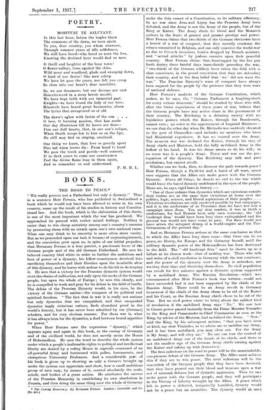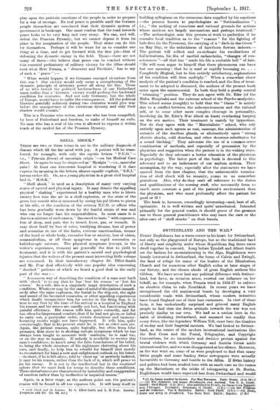BOOKS.
THE ROAD TO PEACE.*
" WE really possess not a Fatherland but only a dynasty." Thus in a sentence Herr Fernau, who has published in Switzerland a book which he would not have been allowed to write in his own country, sums up the result of his studies in history and Constitu- tional law. And the book, which in the elaboration of this thesis, is one of the most important which the war has produced. We approached its perusal with rather mixed feelings. Nothing is easier than to win cheap notoriety among one's country's enemies by presenting them with an attack upon one's own national cause. What one may think to be sincerity is more often sheer vanity. But as we proceeded upon our task it became of engrossing interest, and the conviction grew upon us, in spite of our initial prejudice, that Hormtym Fernau is a true patriot, a passionate lover of the German people mad of the old German Fatherland. Ho sees his beloved country bled white in order to further the ambitions and love of power of a dynasty, his fellow-countrymen deceived into sacrificing themselves and their liberties upon the insatiable altar of this dynasty, and he burns with ardour to do his bit in destroying it. Ho sees that a victory for the Prussian dynastic system would rivet the chains of militarism, not only upon the necks of the German people, but upon the whole of Europe ; ho secs this clearly, and he is compelled to work and pray for its defeat in the field of battle. The defeat of the Prussian Dynasty would, in his eyes, be the victory of the German nation—the conquest of its political and spiritual freedom. " The fact that in war it is really not nations but only dynasties that are vanquished, and that vanquished dynasties imply victorious nations, finds abundant proof in the world's history, but it has never been admitted by our [German] scholars, and for very ObViMIN reasons. For them war is, what it has always been for the dynasties, a duel between brutal appetites for power."
When Herr Fernau uses the expression " dynasty," which appears again and again in this book, as the enemy of Germany and of the civilized world, lie does not merely mean the House of Hohenzollern. Ile uses the word to describe the whole sy-stem under which a people's inalienable rights to political and intellectual liberty are denied by a ruling House in supressie command of an all-powerful Army and buttressed with police, bureaucrats, end obsequious University Professors. And a considerable part of his book is given up to showing, as only a German brought up under the system can appreciate and show, how a small ambitious group of men may, by means of it, control absolutely the souls, minds, and bodies of a great nation. He attributes the success of the Prussian Monarchy in establishing its own absolutism in Prussia, and then doing the same thing over the whole of Germany • The Coming Democracy. By liermaaa Race. Louden Constable sad Co. [es net.) under the thin veneer of a Constitution, to its military efficiency. In no war since Jena and Ligny has the Prussian Army been defeated, and the Army is not the Army of the people, but of the King or Kaiser. The Army sheds its Wood and the Monarch gathers in the fruits of greater and greater prestige and power. Herr Fernau claims that two-thirds of the German electorate hays a horror of a war of conquest, that they secretly condemn the crimes conunitted in Belgium, and can only conceive the world-war as duo to Cossack invasions, bombs dropped by French aviators, and " actual attacks " by jealous enemies upon their peaceful country. Herr Fenian claim, that, humbugged by the lies put forth during those fateful days immediately preceding the war, " two-thirds of the German soldiery have taken the field with a clear conscience, in the proud conviction that they are defending their country, and in the firm belief that ' we ' did not want tho war." The Prussian Dynasty's wars of conquest have always been sugared for the people by the pretence that they wore wars of national defence.
Herr Fernau's analysis of the German Constitution, which makes, as he says, the " German Parliament a laughing-stock for every serious dernecrat," should be studied by those who still, after the bitter experiences of three years of war, believe that the German people have any active share in tho government of their country. The Reichstag is a debating society with no legislative powers which the Kainer, through the Burniesrath, cannot veto ; no voice in the appointment of Imperial Ministers—. we saw that the other day when Dr. Michaelis was suddenly elevated to the post of Chancellor—and includes no members who have had Ministerial experience. It has no control over the Army. The mentent war was declared the Kaiser, through his ring of Army chiefs and Ministers, held the fully mobilized Army in the hollow of his hand. It was his Army sworn to do his will ; in no sense was it a people's Army. Peace and war are the pre- rogatives of the dynasty. The Reichstag may talk and peas resolutions, but cannot revolt.
Whither can we look, then, to discover the path towards ponce ? Herr Fennel, though a Parnieist and a hater of all wars, never once suggests that the Allies can make peace with the German Dynasty. Above all things, he dreads an end to the war which would leave the hated dynasty undefeated in the eyes of the people. There are, he says, rigid laws in history :- " One of these ordains that dyne-sties which are victorious outside their realms aro at the same time victorious at home over the politics, logic, science, said liberal aspirations of their peoples.. .. Victorious revolutions aro only rendered [sensible by lost campaigns, and it is the misfortune of us Prussians that we have not lost o campaign since Jena. Yes, my dear readers, it was iu truth a misfortune, for had Prussia been only once overcome, the old bankrupt firm' would have been long since extinguished end the present war would not have comp to [sue. For then would not have arisen the arrogant dream of a world-empire and the Pans Germanism of the present day."
And so Hermann Fernau arrives at the same conclusion as that to which the Allies have lung since come—that there can bo no peace, no liberty, for Europe and for Germany herself, until the military dynastic power of the Hohenzellerns has been destroyed in the field. The " old bankrupt firm must, be shown up as 11. failure at its chosen work—that of making war. Those who talk and write of a civil revolution in Germany while the war continues, and the power of the dynasty over the Army is unbroken, are wasting their time and deceiving themselves. No civil population can revolt for five minutes against a dynastic system supported by a mobilized Army. The Russian Revolution—whirls was consummated after Harr Fornau's book was written--could not have succeeded had it not been supported by the chiefs of the Russian Army. There could be an Army revolt in Gertnany to-morrow if the chiefs of the Army chose to be rid of the Kaiser and his Court, as the Russian Army chiefs; chose to be rid of tho Tsar. But no civil power exists to bring about the mildest kind of revolution if the nuebilieed Army says " No." We saw• how in Greece power passed instantly from the Prime Minister Venisches to the King and Commander-in-Chief Constantine as soon as the King, by advice of the Minister, had mobilized the Army. " Now," said the King, by his subsequent actions, " that you have been so kind, my dear Venieelos, as to mlviso me to mobilize any Army, and it has been mobilized, you may clear out. For the Army is My Army, and will obey me." No one can tear the control of an undefeated Army out of the hands of its chiefs, and there is not the smallest sign of the German Army chiefs turning against the Kaiser and taking up with democracy.
The first milestone on the road to peace will be the unmistakable, conspicuous defeat of the German Array. The Allies must achieve this if they aro to win peace. The next milestone will he the conviction of the German pcoplo that they have been drecivel, that they have poured out their blood and treasure upon a war not of national defence but of dynastic aggression. Then we can make peace with the German people, and they will participate in the Victory of Liberty wrought by the Allies. A peace which left in power a defeated, temporarily humbled, dynasty would not be a peace but an armistice. The dynasty would at once, play upon the patriotic emotions of the people in order to private for a war of revenge. No real peace is possible astir the German people themselves are convinced that their dynastic system of government is hankrupt. One must confess that the road towards peace looks to be very long and very stony. We can, and will, defeat the Prussian Dynasty-, but we cannot depose it from its place in the imagination of the people. They alone can do this for themselves. Perhaps it will be wiser for us to consider one thing at a. time, and to get forward with ilia first job—that of defeating the dynastic enemy in the field. Those--there are not many of them—who believe that peace can be reached without this essential preliminary of military victory for the Allies should read what Herr Fermis a " democrat and Paeificist," has, to say of such a " peace " .-
" What would happen if we Germane emerged victorious from this war ? Our victory would only mean a strengthening of the dynastic principle of arbitrary power all along the line. Those of us who bewail the political backwardness of our Fatherland must realize that a ` German' victory would prolong this backward condition for centuries. And not only Germany, but the whole of Europe, would have to suffer the consequences. All the political liberties painfully achieved during two centuries would give way before the omnipotence of the victorious dynasty and only their shadow would remain."
This is a Prussian who writes, and one who has been compelled, by love of Fatherland and freedom, to make of himself an exile. No man who has a soul of his own is allowed to. express it within reach of the moiled fiat of the Prussian Dynasty.



































 Previous page
Previous page